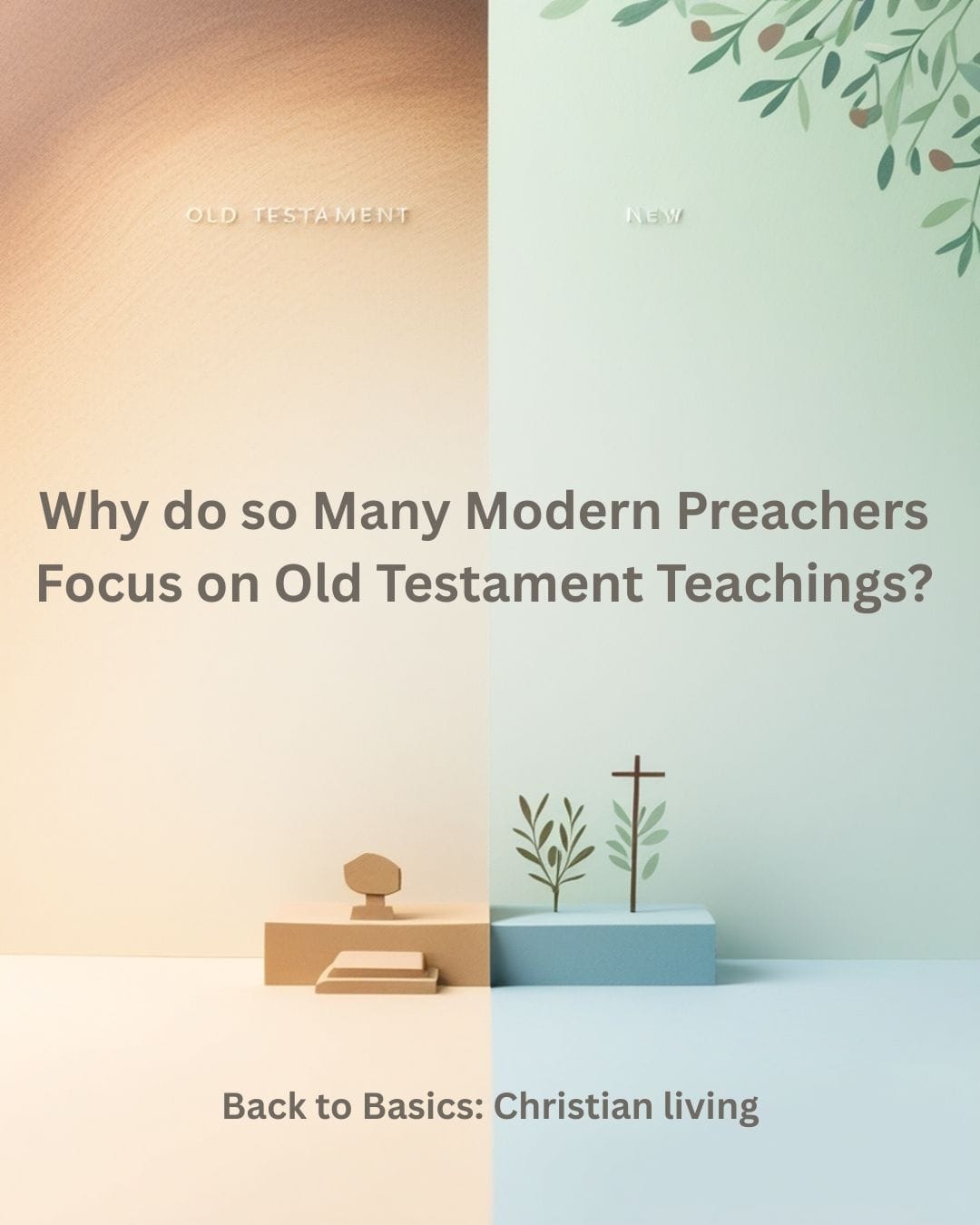The Christian Compass…

Saturday, 30 August 2025
Welcome to This Week's Christian Compass!
Greetings, faithful readers! In this week's Christian Compass, we're diving deep into what truly matters—putting Christ at the centre of our faith. Join us as we explore five powerful teachings from the past week, ranging from understanding the New Covenant to responsible biblical interpretation. We'll examine why context matters when studying Scripture, the nuances of Bible translations, and what it truly means to "press toward the mark" in our Christian journey.
As always, we've included practical challenges to transform these insights into daily habits, key takeaways to remember throughout your week, and an encouraging message about proclaiming Christ in every aspect of your life. Whether you're seeking deeper biblical understanding, practical faith applications, or simply a spiritual boost, this edition offers something meaningful for every believer committed to authentic Christian living.
So grab a cup of tea or coffee, find a quiet corner, and let the Holy Spirit speak to you through these reflections designed to navigate life's journey with faith, love, and wisdom!
Weekly Inspirational Reflections: A weekly segment offering spiritual insights and biblical reflections to inspire and strengthen your Christian Walk…
Putting Christ at the Heart of Christianity!
In an age where Christianity is often reduced to moral codes, political stances, or self-help strategies, we must return to our foundational truth: Jesus Christ Himself must be at the very centre of our faith. The apostle Paul declared with unwavering conviction, "For I determined not to know any thing among you, save Jesus Christ, and him crucified" (1 Corinthians 2:2 KJV). This laser-focused commitment to Christ-centredness must define authentic Christianity today.
When we examine Scripture, we discover that Jesus is not merely a component of our faith—He is its very essence. "In the beginning was the Word, and the Word was with God, and the Word was God" (John 1:1 KJV). Christ is not simply a teacher of truth; He is "the way, the truth, and the life" (John 14:6 KJV). Our faith isn't primarily about doctrines, traditions, or even morality—it's about a Person.
Too often, we drift toward Christ-supplemented lives rather than Christ-centred ones. We add Jesus to our existing identities, priorities, and ambitions rather than allowing Him to fundamentally transform them. Yet Scripture calls us to a more radical reorientation: "I am crucified with Christ: nevertheless I live; yet not I, but Christ liveth in me" (Galatians 2:20 KJV).
This Christ-centredness manifests in three crucial dimensions. First, in our thinking: "Let this mind be in you, which was also in Christ Jesus" (Philippians 2:5 KJV). Our worldview, values, and perspectives must be continually reshaped by Christ's teachings and example.
Second, in our affections: "Set your affection on things above, not on things on the earth" (Colossians 3:2 KJV). When Christ truly occupies the heart's throne, our desires and passions are progressively aligned with His.
Third, in our actions: "He that saith he abideth in him ought himself also so to walk, even as he walked" (1 John 2:6 KJV). Authentic Christ-centredness inevitably produces Christ-likeness in daily living.
The magnificent promise is that as we fix our gaze upon Christ, transformation naturally follows: "But we all, with open face beholding as in a glass the glory of the Lord, are changed into the same image from glory to glory, even as by the Spirit of the Lord" (2 Corinthians 3:18 KJV).
In our complex modern world with its competing voices and distractions, the call remains clear: "Looking unto Jesus the author and finisher of our faith" (Hebrews 12:2 KJV). This singular focus doesn't diminish our engagement with Scripture, community, or mission—rather, it properly orients them around their true centre.
As we navigate theological debates, cultural challenges, and personal struggles, may we continually return to this foundational truth: Christianity is Christ. He is not merely the founder of our faith but its very substance. When we place anything—even good things—at the centre instead of Him, we distort the gospel and diminish its power.
Let us therefore "grow in grace, and in the knowledge of our Lord and Saviour Jesus Christ" (2 Peter 3:18 KJV), ensuring that in all things, He might have the pre-eminence
"And he is the head of the body, the church: who is the beginning, the firstborn from the dead; that in all things he might have the pre-eminence" (Colossians 1:18 KJV).
Weekly Review: exploring our daily journey of building strong spiritual foundations…
Monday 25/08/25
Why the Focus on Old Testament Teachings?
While the Old Testament provides valuable insights into God's character and redemptive plan, many modern preachers overemphasise its teachings without properly contextualising them through the lens of Christ's finished work. This imbalance can inadvertently lead believers into a law-based relationship with God rather than embracing the grace-centred approach Jesus established. The New Covenant represents a complete paradigm shift—not merely an improvement on the old system, but a revolutionary new way of relating to God through Christ as our mediator. As born-again believers, we now enjoy direct access to the Father, Spirit-led living, and a relationship based on sonship rather than servitude. Modern teaching must maintain this delicate balance: honouring God's entire Word whilst clearly presenting the transformative nature of the New Covenant and the profound implications of our new identity in Christ. It's time for contemporary preaching to fully embrace this reality and lead believers into the abundant life characterised by grace, freedom, and intimate relationship with our heavenly Father…

Tuesday 26/08/25
Biblical Interpretation without Boundaries leads to Spiritual Chaos!
The Bible's meaning is not a matter of personal preference or subjective interpretation. In our increasingly relativistic world, many approach Scripture as if any interpretation is valid as long as it feels right to them. This dangerous approach undermines the very authority and purpose of God's Word. When Scripture becomes merely a mirror reflecting our own biases rather than divine revelation, we lose the foundation of our faith. Proper biblical interpretation requires attention to context, historical background, and the overall teaching of Scripture within the community of faith. We must approach God's Word with both conviction about its clarity and humility about our understanding. Remember: if the Bible can mean anything to anyone, it ultimately means nothing at all. Only by seeking what God intended to communicate—not what we want it to say—does Scripture fulfil its purpose as the authoritative, life-transforming Word of our Heavenly Father…

Wednesday 27/08/25
The Danger of Modern Bible Translations!
While modern Bible translations make Scripture more accessible, they risk compromising accuracy for readability. This teaching examines how contemporary versions can distort God's intended message, particularly when they diminish the crucial connection between knowledge and action that permeates Scripture. Drawing from passages in Colossians, Matthew, James and Romans, we explore how translations like the KJV often preserve theological nuances lost in more dynamic renderings. Scripture isn't merely for accumulating knowledge—it's meant to transform our lives through application. We encourage believers to approach Bible study with discernment, comparing multiple translations and seeking God's guidance to properly understand and live out His Word. True faith manifests not just in knowing the right doctrines, but in walking worthy of the Lord, bearing fruit in every good work, and growing in our relationship with Him…

Thursday 28/08/25
Rightly Dividing the Word of Truth
In our modern world of individualised spirituality, DIY Bible interpretation has become increasingly common. This dangerous approach treats Scripture as a blank canvas for personal opinions rather than God's revealed truth with fixed meaning. Our latest teaching explores why context and tradition matter when studying God's Word. We examine how subjective interpretation undermines Scripture's corrective function, hinders church unity, and weakens discipleship. The Bible wasn't written in a vacuum—it was given within specific historical contexts that we must understand. While the Reformers championed Bible access for all believers, they never intended a free-for-all of contradictory interpretations. Instead, we need sound hermeneutical principles and the guidance of Christian community. With humility and careful attention to context, we can discover what God truly intended to communicate rather than imposing our own ideas. Only then does Scripture fulfil its purpose as the authoritative, life-transforming revelation of our Heavenly Father…

Friday 29/08/25
Embracing the Race of Faith: Paul's Vision for Christian Living!
Pressing toward the mark of Christlikeness is the essence of authentic Christian living. In this powerful teaching, we explore what it truly means to be a Christian through the lens of Philippians 3:13-14 KJV. Like athletes in a race, we are called to pursue Christ with determination and zeal, not casual commitment. Our ultimate goal is conformity to Christ—knowing Him, loving Him, and becoming like Him in character.
This teaching delves into the importance of leaving the past behind, whether failures or achievements, and embracing spiritual disciplines like prayer, Bible study, and fellowship. We address the obstacles Christians face from the world, our sinful nature, and spiritual forces, while emphasising the vital role of community in our journey. Throughout it all, we're reminded that we run not in our own strength, but through God's sustaining grace and empowering Spirit.
Whether you're new to faith or have walked with Christ for decades, this message will inspire you to press on toward the mark with renewed vigour, fixing your eyes on the prize that awaits faithful believers…

Living Out Our Faith: Weekly Challenges! A practical guide offering weekly steps to apply your spiritual learning. These challenges turn Bible teachings into daily habits through simple, doable actions…
Ready to transform knowledge into action? This week's challenges invite you to take what you've learned and apply it practically in your daily walk with Christ. Each day offers a specific opportunity to deepen your faith through intentional practice. Remember, our Heavenly Father isn't looking for perfection—He's delighting in your willingness to grow! As James reminds us, we must be "doers of the word, and not hearers only" (James 1:22 KJV). Let these challenges guide you toward a more authentic, vibrant relationship with God as you put your faith into action!
This Week's Living Out Our Faith: Weekly Challenges
- Monday's Challenge: Examine your relationship with God through the lens of the New Covenant. Spend time reflecting on how you relate to God—is it based on rules and performance or grace and sonship? Choose one area where you can embrace your identity as God's child rather than trying to earn His approval.
- Tuesday's Challenge: When studying Scripture this week, resist the temptation to interpret passages based solely on personal preference. Before drawing conclusions, research the historical context and consult trusted commentaries. Share what you've learned with a fellow believer to gain additional perspective.
- Wednesday's Challenge: Compare a key verse from your regular Bible reading in multiple translations, including the KJV. Note any significant differences in meaning. Then identify one specific action you can take to apply this Scripture to your life, remembering that biblical knowledge should lead to transformation.
- Thursday's Challenge: Join or initiate a small group Bible study where you can discuss Scripture interpretations within community. Practice humility by considering viewpoints that differ from your initial understanding, recognizing that proper interpretation often happens best in fellowship with other believers.
- Friday's Challenge: Identify one thing from your past—whether a failure or achievement—that you need to leave behind to better "press toward the mark" of Christlikeness. Then establish a specific spiritual discipline (prayer, Bible study, service) to practice consistently this week, focusing on knowing Christ more intimately.
As you journey through this week, remember that God's grace is not just a concept but a powerful reality available to you every moment. The teachings we've explored are not merely intellectual exercises—they're invitations to experience deeper intimacy with your Heavenly Father. You are not alone in your struggles or victories; the same Spirit that raised Christ from the dead dwells within you, empowering you to live in the fullness of your identity as God's beloved child.
When doubts arise or challenges seem overwhelming, recall that you have been equipped with everything needed for life and godliness. Your faith is not built on shifting sand but on the solid rock of Christ's finished work. Each step of obedience, each moment spent in God's presence, and each truth embraced builds spiritual momentum that carries you forward in your walk with the Lord.
May you be encouraged today knowing that God sees your heart, values your efforts, and delights in your growth. The journey of faith is not about perfection but progression—moving ever closer to the mark of Christlikeness through the transforming power of God's grace. Stand firm in what you've learned, apply it with confidence, and watch how God works mightily through your surrendered life!
This Week's Key Takeaways:
- 1. New Covenant Focus: While the Old Testament provides valuable insights, modern preaching must emphasise Christ's finished work and the grace-centred relationship it established, rather than leading believers into law-based approaches.
- 2. Responsible Biblical Interpretation: Scripture's meaning isn't subjective—proper understanding requires attention to context, historical background, and the overall teaching of God's Word within the community of faith.
- 3. Translation Discernment: While modern Bible translations improve accessibility, they can sometimes sacrifice theological nuance for readability. Compare multiple translations and seek God's guidance for proper understanding.
- 4. Community-Based Understanding: Individualised Bible interpretation undermines Scripture's authority and purpose. The Christian community provides essential context and accountability for properly understanding God's Word.
- 5. Purposeful Christian Living: Authentic faith means actively pursuing Christlikeness through spiritual disciplines, leaving the past behind, and pressing forward with determination—not through our own strength, but by God's empowering grace.
Standing Strong in Faith! You are equipped with God's strength to build an unshakeable faith—one that will inspire generations to come!
Proclaiming Christ: The Heart of Christian Living!
In a world filled with competing voices and philosophies, the believer's calling to proclaim Christ remains our highest purpose. This proclamation isn't merely confined to church pulpits or evangelistic crusades—it's woven into the very fabric of our daily Christian walk.
The Apostle Paul understood this profound reality when he declared, "For I determined not to know any thing among you, save Jesus Christ, and him crucified" (1 Corinthians 2:2 KJV). This singular focus! shaped not only his ministry but his entire existence. For Paul, proclaiming Christ wasn't a secondary consideration but the central passion that drove every decision.
Our proclamation begins with our words. Scripture reminds us, "Let the redeemed of the LORD say so, whom he hath redeemed from the hand of the enemy" (Psalm 107:2 KJV). Our testimony—the story of Christ's redemptive work in our lives—becomes a powerful declaration of God's grace. Yet this verbal witness must flow from authentic experience, for "That which we have seen and heard declare we unto you, that ye also may have fellowship with us" (1 John 1:3 KJV).
However, proclaiming Christ extends far beyond mere speech. Our lives themselves become living epistles, as Paul writes: "Ye are our epistle written in our hearts, known and read of all men" (2 Corinthians 3:2 KJV). When our conduct aligns with our confession, we silently yet powerfully declare Christ's transformative presence. Peter reinforces this truth, instructing believers to maintain "your conversation honest among the Gentiles: that, whereas they speak against you as evildoers, they may by your good works, which they shall behold, glorify God in the day of visitation" (1 Peter 2:12 KJV).
This proclamation often requires courage in hostile environments. Jesus warned, "If the world hate you, ye know that it hated me before it hated you" (John 15:18 KJV). Yet He also promised, "I am with you alway, even unto the end of the world" (Matthew 28:20 KJV). This divine presence empowers our witness even amid opposition.
Our proclamation must be characterized by both truth and grace. We speak "the truth in love" (Ephesians 4:15 KJV), remembering that we ourselves were once "alienated and enemies in your mind by wicked works" (Colossians 1:21 KJV) before Christ's mercy transformed us.
Finally, proclaiming Christ requires perseverance. Paul's testimony at life's end provides our model: "I have fought a good fight, I have finished my course, I have kept the faith" (2 Timothy 4:7 KJV). Through times of blessing and trial, our consistent proclamation testifies to Christ's sufficiency.
As believers navigating an increasingly secular age, our proclamation of Christ—through word and deed, in public and private spheres—remains our most sacred calling. For ultimately, "at the name of Jesus every knee should bow, of things in heaven, and things in earth, and things under the earth; And that every tongue should confess that Jesus Christ is Lord, to the glory of God the Father" (Philippians 2:10-11 KJV).
In Christ
David










